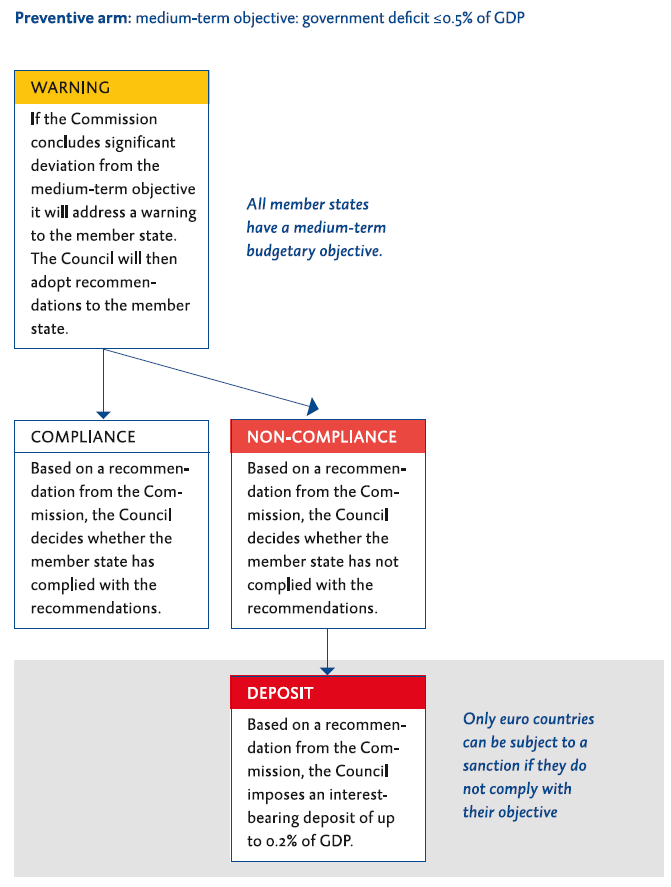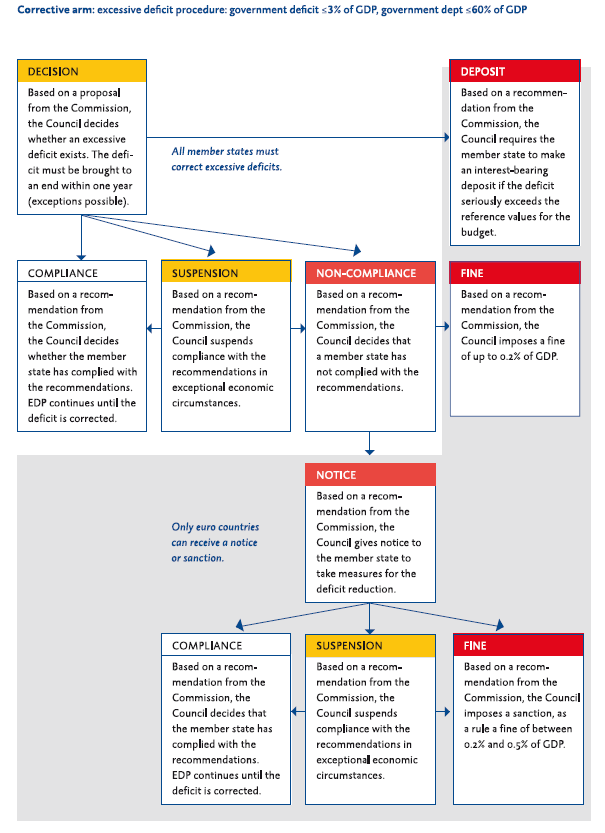Budget Surveillance in the EU
EU-member states are required to comply with the European budget requirements. They are obliged to balance out public income and expenditure in the medium term. To this end, each member state is given an ‘adjustment path’ with an annual budget deficit target. These agreements are part of the preventive arm of European budget surveillance. As an extra incentive, there is a corrective arm, which attaches maximum values to annual budget deficits and government debt. The European Commission and Ecofin are authorised to supervise whether the member states comply with the budget agreements.

Preventive arm: balanced budget in the medium term. The requirement for almost all EU member states is to reduce the structural (cyclically-adjusted) budget deficit to a maximum of 0.5% of GDP. This requirement follows from the Treaty on Stability, Coordination and Governance in the Economic and Monetary Union, signed by 25 member states. Czechia and Croatia (and the UK as former EU member) have not signed the treaty. These countries have concluded separate agreements about member-state specific medium-term objectives.
Corrective arm: excessive deficits. All EU-member states are required to comply with the agreements on budget deficits and government debt in the short term. A member state’s budget deficit may not exceed 3% of GDP, and government debt may not exceed 60% of GDP. If it does, government debt and the budget deficit must be reduced sufficiently. If member states do not comply with the budget deficit or government debt reference values, the Ecofin council may decide that a country has an excessive deficit.
Course of the procedures: the two procedures take a comparable course. If a member state exceeds its budget reference values, it is obliged to take action. To this end, the member state receives recommendations from the Ecofin Council. If the country complies with the recommendations and corrects the overruns, the procedure is closed. Non-compliance with recommendations may lead to the member state having sanctions imposed. Sanctions are only possible for euro-area countries. Non-euro countries are not subject to sanctions.

Decisions: the Ecofin-Council decides on whether a member state is subjected to one of the two procedures, and the course that this procedure takes. The European Commission gives recommendations to the Ecofin Council, and decisions are taken on the basis of qualified majority voting, or reverse qualified majority voting. In case of the latter, the Council adopts a decision recommendation from the European Commission, unless the Council explicitly votes against the recommendation. The member state in question does not join in the voting. Euro-area countries only are allowed to join in the voting about decisions on euro-area countries.

Preventive arm > medium-term objectives

Preventive arm: medium-term budgetary objectives
All EU member states have their country-specific targets known as medium-term objectives. The structural budget deficit may not exceed 0.5% of GDP.
Warning: If the Commission establishes a significant deviation from the medium-term budgetary objectives, it issues a warning to the member state, and gives recommendations to that member state.
Compliance or non-compliance: Based on a recommendation from the Commission, the Council then establishes whether or not the member state has complied with these recommendations.
Deposit: Based on a recommendation from the Commission, the Council may impose, on euro-area countries only, an interest-bearing deposit of a maximum of 0.2% of GDP in case of non-compliance.
Corrective arm

Corrective arm: excessive deficit procedure
Decision: The maximum limit for the member states is a budget deficit of 3% of GDP and government debt of 60% of GDP. If a member state breaches this limit, the Council, based on a recommendation from the Commission, decides whether an excessive deficit exists and issues recommendations to that member state. An excessive deficit must in principle be corrected within one year.
What are the subsequent stages after a breach has been established and recommendations have been issued?
Deposit: Based on a recommendation from the Commission, the Council may require the member state to make an interest-bearing deposit if the deficit seriously exceeds the budget reference value.
Compliance: Based on a recommendation from the Commission, the Council decides that the member state has complied with the recommendations, or:
Suspension: Based a recommendation from the Commission, the Council may grant suspension of compliance with the recommendations, or:
Non-compliance: Based on a recommendation from the Commission, the Council decides that a member state has not complied with the recommendations.
Fine: Based on a recommendation from the Commission, the Council may impose a fine of a maximum of 0.2% of GDP in case of non-compliance (and no suspension) with the recommendations. This applies to euro-area countries only, or:
Notice: Based on a recommendation from the Commission, the Council may also give notice to a euro-area country.
Which stages may follow a notice?
Compliance: Based on a recommendation from the Commission, the Council decides that the member state has complied with the recommendations, or:
Suspension: Based on a recommendation from the Commission, the Council may suspend compliance with the recommendations in exceptional circumstances, or:
Non-compliance: Based on a recommendation from the Commission, the Council may impose a fine of between 0.2 and 0.5% of GDP in case of non-compliance (and no suspension) with the recommendations.